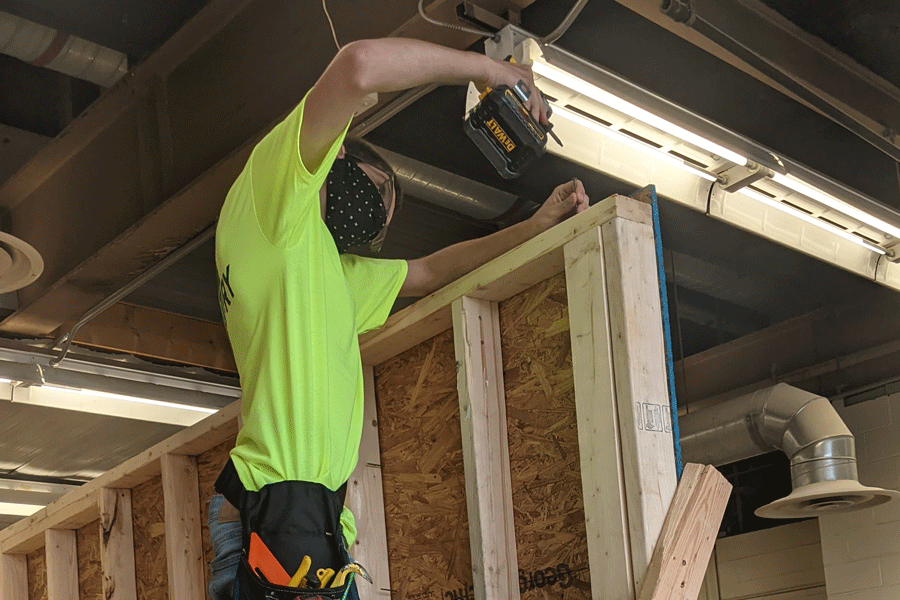Under construction: trade schools are drastically underrated (Editorial)
BUILDING BLOCKS: Construction student, Lucas Sandoval drills in that this is his path. “Student enrollment has significantly increased,” according to department head, Dr. Albert Parrillo.
Carpenters, mechanics, electricians, oh my! Trade jobs are always in high demand in our fast-paced society and people often forget how necessary these workers are. High school students are often told that to succeed in life they must go to a college with renowned alumni and graduate with the highest honors if they are to even think of getting a well-paying job. But what about the trade professions?
Vocational schools (trade schools) emphasize career-focused training in fields like healthcare, manufacturing, and technology. During a vocational program, students gain practical knowledge and skills in their specific area of study. After completing their degree or certificate, they then go out into the world to pursue careers in their field. The world always needs electricians and plumbers, people that instead of choosing a college, chose a vocational program instead.
Vocational schools cost significantly less than college and they do not require as many years of academic commitment, according to the academic website Trade School vs. College: Which One is Right For You?. College typically lasts four years depending on the major and the intended future career path. Of course, whatever the career plan is, there may be more school to attend after college to get the proper credentials.
However, vocational schools will put students out into the world far faster than a four-year college would. This means that graduates could be making money as early as a year out of school. According to the U.S. Bureau of Labor Statistics, the median hourly rate for installation, maintenance, and repair occupations is around $23.87 with yearly earnings at an even $51,690.
Carlisle High School has its own such trade programs in its Center for Careers and Technology (CTE) like carpentry, automotive technology, culinary arts, and many more. The focus of these electives is to train students in state-of-the-art facilities and to help them learn and apply industry standards and techniques for their chosen trade profession.
According to the program’s mission statement, CTE will “[use] current and emerging technology, along with fundamental principles […] to enable students to become lifelong learners and to adapt to and succeed in the ever-changing world and labor market.”
These classes expose students to these standards with hands-on experience and live-work contact.
“We have seen a significant increase in students enrolling in Career and Technical courses from all demographics,” said Dr. Albert Parrillo, head of the CTE department at Carlisle High School.
Parrillo credits this increase in part to the addition of two newer programs, Marketing and Engineering.
Chris Rupp is an electrician who has gone through trade programs and currently has a job at an elevator installation company.
“One of the most important things about this type of profession is having pride in your work,” said Rupp. “After doing these jobs for a while, the money doesn’t matter as much and all of my motivation comes from the pride of knowing that I did a good job.”
It doesn’t matter if you know what you wish to do with your future, it’s perfectly okay to be unsure. If you’re a student in high school, you’ve got time to figure it out. What does matter is that you find a job you enjoy doing, regardless of its salary. As long as you are happy doing what you want, it doesn’t matter what anyone else should tell you to pursue.
Disclaimer: Articles designated as “Editorial” represent the views and opinions of the author, not the 2020-2021 Periscope staff, CHS/CASD administration, or the CHS student body.
Want to help the Herd? Please consider supporting the Periscope program. Your donation will support the student journalists of CHS and allow us to purchase equipment, send students to workshops/camps, and cover our annual website hosting costs.

Ryleigh Underwood is a senior at CHS and this is their fourth year on the Periscope staff. They are the manager of CHS's improv troupe, Wingin' It, the...




























































































